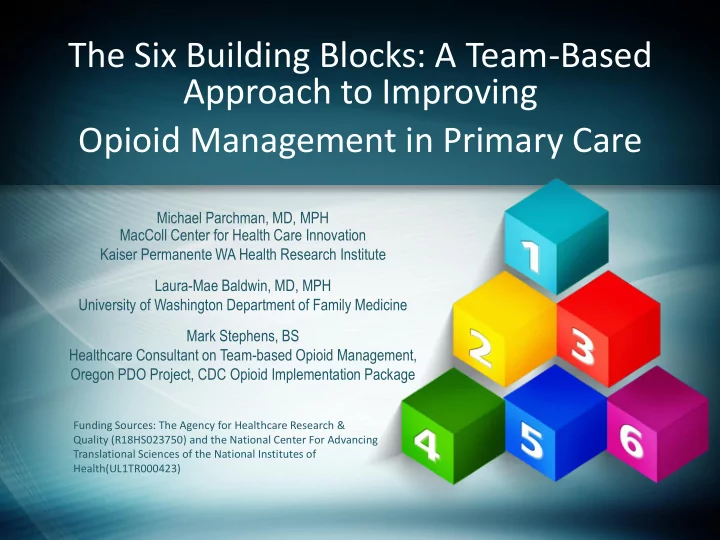

The Six Building Blocks: A Team-Based Approach to Improving Opioid Management in Primary Care Michael Parchman, MD, MPH MacColl Center for Health Care Innovation Kaiser Permanente WA Health Research Institute Laura-Mae Baldwin, MD, MPH University of Washington Department of Family Medicine Mark Stephens, BS Healthcare Consultant on Team-based Opioid Management, Oregon PDO Project, CDC Opioid Implementation Package Funding Sources: The Agency for Healthcare Research & Quality (R18HS023750) and the National Center For Advancing Translational Sciences of the National Institutes of Health(UL1TR000423)
Innovative Primary Care Practices Nationally were Addressing the Opioid Crisis through Team-Based Care *LEAP: L earning from E ffective A mbulatory P ractices (RWJF-funded)
Learnings from these practices organized into the Six Building Blocks of Safer Opioid Management and published in the Journal of American Board Family Medicine in February 2017
Six Building Blocks (6 BBs) Building Block 1: Leadership and consensus • Build organization-wide consensus to prioritize safe, more selective, and more cautious opioid prescribing. Building Block 2: Track Patients on COT • Implement pro-active population management before, during, and between clinic visits of all COT patients: safe care & measure improvement. Building Block 3: Revise policies and standard work • Revise and implement clinic policies and define standard work for health care team members to achieve safer opioid prescribing and COT management in each clinical contact with COT patients.
Six Building Blocks Building Block 4: Prepared, patient-centered visits • Prepare and plan for clinic visits of all patients on COT to ensure that care is safe and appropriate. Support patient-centered, empathic communication for COT patient care. Building Block 5: Caring for complex patients • Identify and develop resources for patients who become addicted to or who develop complex opioid dependence. Building Block 6: Measuring success • Continuously monitor progress and improve with experience.
Team-Based Opioid Management in Primary Care • A research project in 20 rural and rural-serving clinics in Eastern Washington and Central Idaho • Systems-based approach to implementing the 6 BBs in clinical organizations: – Creation of an opioid quality improvement team at each site – Facilitation by an external practice coach – Team-building Welcome Visit with clinic-wide self-assessment of 6 BBs – Implementation of selected best practices to manage chronic opioids – Tracking of opioid use and management practices
What have we learned? • Clinicians in clinics with higher BB scores are – More confident in use of opioids for chronic pain – More comfortable prescribing opioids for chronic pain • Participation in the facilitated team-based approach increases clinics’ BB scores
What have we learned? Clinics tackled this re-design work in phases: – Phase 1: Revise policies and patient agreements – Phase 2: Redesign workflows and discuss data for population management – Phase 3: Implement tracking of patients, patient outreach/education and measures of success
What one clinician said about the 6 BBs project: "Having a defined care pathway for an emotionally charged and complex area of care - to walk in with a plan. It's like walking into the ER and someone having a cardiac arrest. Not the most stressful thing I do because we have a clear plan. Now I have the same kind of pathway for opioids. Having what we are going to do defined .”
Recommend
More recommend